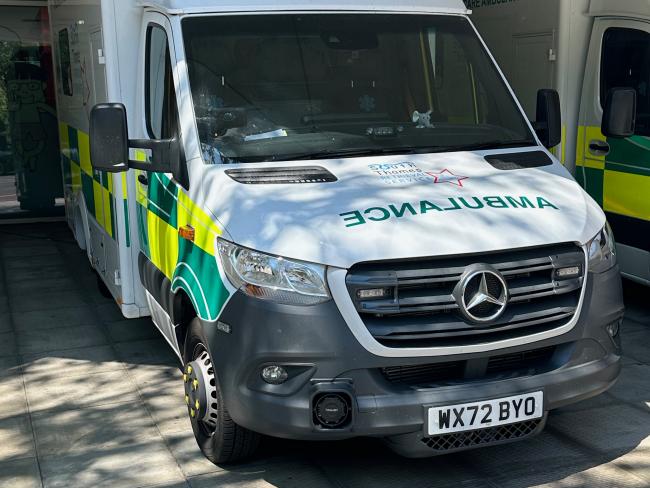8 September 2023

Ambulance for transport of critically ill neonates and children. Photo Workers
The lessons of the Letby affair are many. Chief among them may be the indictment of successive capitalist governments’ interference with the NHS.
This led to a position where neonatologist consultants who tried to do something to stop the murder and attempted murder of at least thirteen neonates at the Countess of Chester Hospital could be ignored, accused of bullying and threatened with being reported to the General Medical Council (GMC), the regulatory body for doctors.
Commerce
Margaret Thatcher introduced, through the 1983 Griffiths Report, managers from commerce to the NHS. The premise was that existing hospital administrators, as they were known, were insufficiently business-minded.
Much has happened since then, population changes, changes in morbidity, advances in medicine and so on. But the introduction of business managers has signally failed to turn the NHS round.
However the service has turned into a happy hunting ground for the big management consultants. A survey by researchers at the University of Bristol looked at 120 hospital trusts over four years and found that spending on management consultants had grown exponentially.
Purchasers and providers
Kenneth Clarke established the “internal market”, ostensibly based on the dogma that applying market principles to health would lead to better outcomes, requiring NHS organisations to be split into purchasers and providers. The Blair government from 1997 continued this, and intensified the attack on professional skill.
At a conference in 2000, the then health-secretary Alan Milburn declared war on what he described as aas a “consultant is king” culture in the NHS. Consultants, the most highly skilled workers in the NHS, were expected to submit their clinical decision-making to the approval of career managers. Their control over postgraduate medical education was weakened and professional self-regulation was denounced as reactionary and elitist.
‘Successive governments tried to hive off direct responsibility for the NHS.’
Successive governments tried to hive off direct responsibility for the NHS. Arms-length bodies proliferated to carry out functions previously part of the Department of Health. These bodies, such as NHS England, Health Education England and NHS Digital, exist in perpetual states of restructuring, merger and de-merger, so nothing gets done. This is amplified by devolution of health services for Scotland and Wales.
The senior managers who ignored concerns and tried to block investigations into the unexplained deaths at the Countess of Chester moved on to other, highly-paid management jobs in the NHS. One worked in an interim appointment at two trusts – some senior managers make careers as fill-in Chief Executives here and there.
Regulatory failure
The failure of regulatory bodies is another aspect. The Care Quality Commission, set up in 2009, is supposed to inspect hospitals and other providers. It inspected the Countess of Chester hospital in 2016 and found it “good” and “well led”. The GMC was used to threaten the neonatologist consultants, rather than to uphold medical professional standards.
Much is made in the NHS of whistleblowers. A system of Freedom to Speak Up Guardians was established after the Francis report into Mid Staffordshire. The Letby affair shows that these posts are nothing but window dressing.
‘Skilled workers, working together, protect patient safety.’
The cult of the whistleblower is anti-working class. Lone individuals do not protect patient safety and professional standards, but skilled workers working together to uphold standards, and force employers to keep to them, as the Countess of Chester consultants tried to do.
Similarly, the anti-bullying cult, behind which Letby and those who facilitated her crimes hid, is anti-working class. No doubt a blackleg in a dispute could raise a claim of bullying. The defence against bullying employers, and the way to a safe well-run NHS, lies in the collective organisation of professional health workers.
